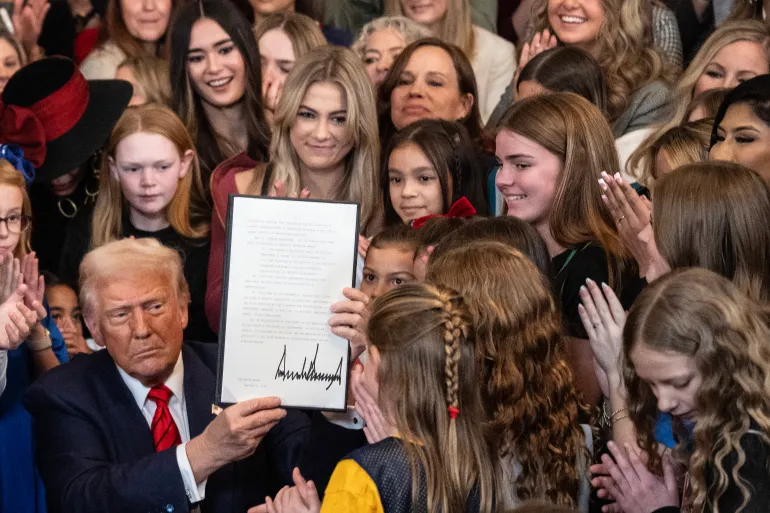
Trump Signs Executive Order Banning Trans Women from Female Sports, Sparking Backlash
LGBTQ Rights Groups Condemn Latest Move Against Transgender Athletes
United States President Donald Trump has signed a sweeping executive order that bars transgender women and girls from participating in female sports. The order, signed on February 5, 2025, also restricts federal funding for educational institutions that allow trans athletes to compete in women’s sports or access female locker rooms.
Federal Funding at Risk for Schools Allowing Trans Athletes
Under the newly enacted policy, any school or institution that permits transgender women to compete in female sports or use designated female facilities could face an investigation for violating Title IX—a 1972 law that prohibits sex-based discrimination in education. Trump framed the executive order as a defense of women’s rights, declaring an end to what he called the “war on women’s sports.”
“We are putting every school receiving taxpayer dollars on notice,” Trump stated. “If you let men take over women’s sports teams or invade female locker rooms, you will be investigated and risk losing federal funding.”
In addition to domestic policies, the order directs government agencies to advocate for sex-based sports categories at international sporting events. Trump vowed to pressure the International Olympic Committee (IOC) to reinforce gender-based eligibility rules before the 2028 Summer Olympics in Los Angeles.
“We want them to change everything having to do with the Olympics and this absolutely ridiculous issue,” he said.
Public Opinion and NCAA’s Response
Transgender participation in sports has been a contentious issue in the United States. While the number of trans athletes competing at elite levels remains small, public opposition has grown in recent years. A 2023 Gallup poll found that 69 percent of Americans believe trans athletes should only compete against individuals of their birth sex, an increase from previous years.
Charlie Baker, president of the National Collegiate Athletics Association (NCAA), welcomed the executive order, stating that it establishes a “clear, national standard” for collegiate sports.
“We strongly believe that clear, consistent, and uniform eligibility standards would best serve today’s student-athletes instead of a patchwork of conflicting state laws and court decisions,” Baker said.
The NCAA Board of Governors is currently reviewing the order and considering policy adjustments in accordance with federal directives.
LGBTQ Advocacy Groups Condemn the Order
The order has been met with sharp criticism from LGBTQ rights organizations and advocacy groups. Athlete Ally, an organization that promotes LGBTQ inclusion in sports, expressed deep disappointment, arguing that the decision robs trans youth of the joy of participating in sports as their “full and authentic selves.”
“This administration continues to pursue simple solutions to complex issues, often resulting in harm towards the most marginalized communities in our country,” Athlete Ally stated. “Despite this order, we will continue to work toward an inclusive future in sports where everyone belongs.”
GLAAD, one of the nation’s largest LGBTQ rights organizations, also condemned the policy, calling it “inaccurate and incoherent.”
“All women and girls, including transgender women and girls, should have the right to participate in sports, make decisions about their bodies, and live free from government overreach,” GLAAD’s statement read. “Anti-LGBTQ politicians who have a history of silencing women and stripping away their healthcare have no credibility in discussions about protecting women’s rights.”
Trump’s Broader Anti-Trans Agenda
This latest order marks Trump’s fourth executive action targeting the transgender community since his return to office on January 20, 2025. On his first day, he issued an order defining gender strictly as male or female under federal law. Subsequent orders banned transgender individuals from serving openly in the U.S. military and blocked federal funding for gender transition treatments for minors.
While Trump’s administration frames these policies as a defense of traditional gender norms, critics argue that they represent a systematic rollback of LGBTQ rights. Legal challenges are expected, and civil rights organizations have vowed to fight the new policies in court.
As the political and legal battles unfold, the fate of transgender athletes in women’s sports remains uncertain. With growing divisions on the issue, this executive order is likely to intensify an already heated debate in the lead-up to the 2028 Olympics and beyond.